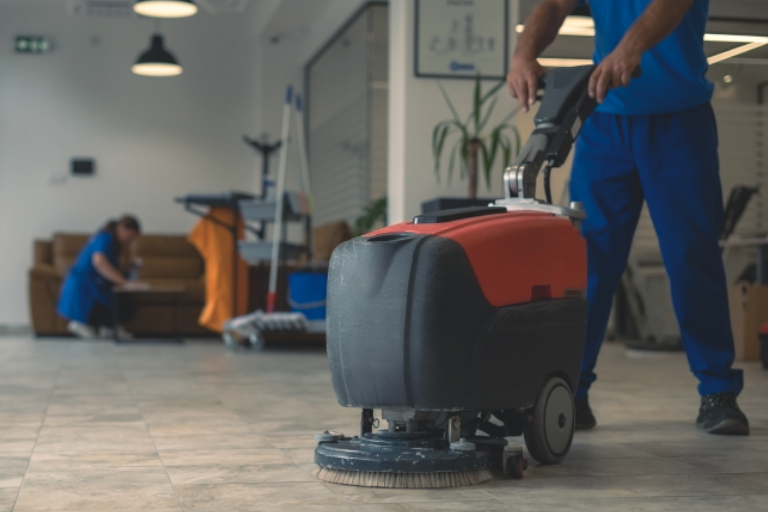Industrial cleaning machines of all types are usually battery powered. In the past, they used the same battery types as forklifts and other industrial mobile machines. These batteries were based on lead-acid chemistry, and there are many types of lead-acid batteries, including AGM and gel type.
Table of Contents:
Key Takeaways:
- Performance is Superior: Li-ion batteries offer up to five times higher energy density and four times longer cycle life (over 2,000 cycles) than lead-acid, leading to lighter, smaller, and more robust cleaning machines.
- Operational Efficiency: Higher efficiency and shorter charge times make Li-ion ideal for multi-shift operation by minimizing downtime and reducing overall operational and maintenance costs.
- Strategic Advantage: Switching to Li-ion solutions provides higher reliability, increased performance, and reduces the environmental footprint—making it the new standard for efficient and sustainable industrial cleaning equipment.
Benefits of lithium-ion batteries in Cleaning Industry
All lead-acid batteries offer similar energy density and performance, but the cycle life may vary. Still, the cycle life is generally low, especially when compared to li-ion batteries. This is especially the case when used in deep discharge cycles.
In the cleaning industry, where machines are often operated intensively and frequently discharged to low levels, this limitation of lead-acid technology becomes a significant operational challenge. Repeated deep discharges accelerate degradation, leading to frequent battery replacements and higher maintenance costs.
Li-ion batteries, by contrast, are far more resilient to deep discharge and partial charging cycles, allowing cleaning machines to operate more flexibly without negatively impacting battery health. This aligns well with real-world cleaning schedules, where opportunity charging and variable usage patterns are common.
Li-Ion becoming top choice for industrial cleaning machines
In recent years, li-ion chemistry has emerged as the top choice for new industrial batteries. This is due to its many advantages: energy density is up to five-times higher in li-ion batteries (50-100 Wh/kg in lead acid vs up to 260 Wh/kg in NCA/NMC cells) and the battery cycle life is also around four-times higher (less than 500 for lead-acid vs over 2,000 for LFP li-ion).
This significant performance gap directly impacts machine design and daily operation. Higher energy density allows manufacturers to build more compact machines or extend runtime without increasing size or weight.
What’s more, lead-acid batteries have a lower energy density than li-ion batteries, meaning they’re usually larger and heavier – something that makes them unsuitable for use in industrial cleaning machines.
Excessive battery weight not only limits maneuverability but also increases mechanical wear on components such as wheels, motors, and frames, raising long-term servicing costs.
Li-ion batteries can last longer and be much lighter, meaning that machines can run for longer and that there’s no need to waste time changing batteries. When a battery change is required, it’s much simpler than changing a lead-acid battery.
In many cases, li-ion solutions eliminate the need for battery swapping altogether, as fast charging and opportunity charging enable continuous operation across multiple shifts.
It’s also the case that the longer service time ensures a longer time between services and slower capacity degradation over time, providing acceptable output over a prolonged period.
This stable performance is especially important in professional cleaning environments, where consistent suction power, brush speed, and runtime directly affect cleaning quality and productivity.
When all is considered, li-ion batteries for industrial cleaning appliances to offer higher performance and lower running costs than lead-acid batteries.
As a result, li-ion technology is increasingly viewed not as a premium option, but as the most economically rational choice over the full lifecycle of the machine.
Choosing the correct Li-Ion battery for cleaning machines
It must be remembered that different types of li-ion batteries have different energy densities, maximum powers, cycle lives, and more. This is why it’s important to work alongside an experienced battery manufacturer.
Selecting the wrong cell chemistry or battery configuration can lead to underperformance, unnecessary oversizing, or reduced safety margins, particularly in machines exposed to moisture, vibration, and continuous operation.
At EMBS, we have experience with a vast range of cell types from a wide range of producers. We test cells internally and/or in external laboratories to confirm their performance and ensure we recommend the best cell for your application, with the best possible battery life, as well as the proper power level and highest safety.
This approach ensures that each battery system is tailored to the real operational profile of the cleaning machine, rather than relying on theoretical specifications alone.
We can also gather real life current consumption data from your machine to ensure the power it needs is provided by the battery.
By analysing actual usage patterns, peak loads, and duty cycles, we can design battery solutions that deliver optimal performance without unnecessary cost or weight.
So if you need any help, contact EMBS specialist!
What are the key advantages of lithium-ion batteries compared to traditional battery chemistries?
Why are Li-ion batteries the preferred choice in the cleaning industry?
What performance benefits do Li-ion batteries offer in terms of efficiency, runtime, and charging speed?
How do the safety and durability advantages of Li-ion batteries impact long-term operational costs?
Sources
Liu, K., Wei, Z., Yang, Z., & Li, K. (2021). Mass load prediction for lithium-ion battery electrode clean production: A machine learning approach. Journal of Cleaner Production, 289, 125159.
Lavoie, Y., Danet, F., & Lombard, B. (2017, September). Lithium-ion batteries for industrial applications. In 2017 Petroleum and Chemical Industry Technical Conference (PCIC) (pp. 283-290). IEEE.
About the Author
EMBS
Leading manufacturer of advanced battery systems with a market presence of over 25 years. We specialise in rechargeable lithium-ion batteries, producing a wide range of systems with varying power and capacity.
